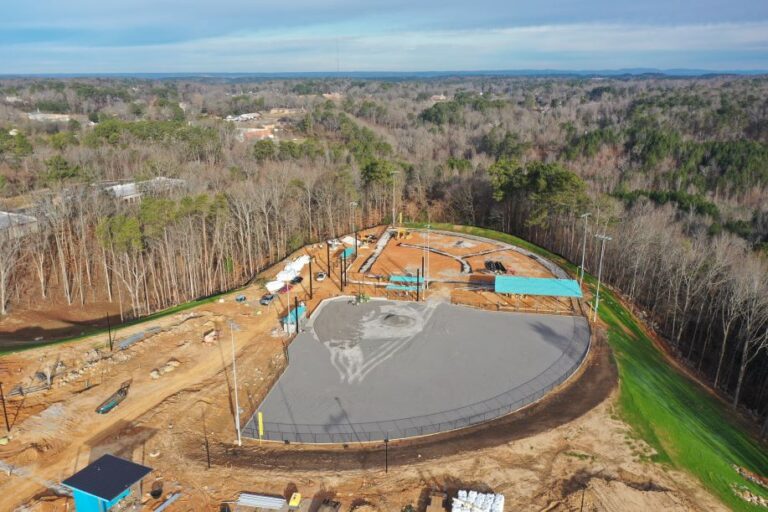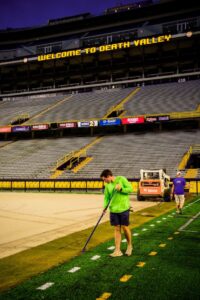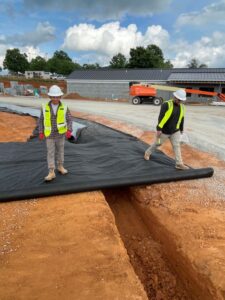By Mary Helen Sprecher
Crafting a request for proposal (RFP) when it comes to having work done on your field can set the stage for success throughout the project. That’s why it is essential to put in the work in advance.
The RFP, when correctly presented, will give prospective vendors everything they need to know. This results in you receiving proposals that, while they may come from different contractors, cover all the work you want performed. To get started, ask yourself the following questions:
What kind of work do I need?
The most important part of writing an RFP is a full description of the project itself. Make this section highly detailed so vendors know exactly what you are looking for and whether they can meet those needs.
For example, whether you are interested in having a field built or renovated, or whether you are looking to perform other upgrades as well – such as the installation of lighting or grandstands – you’ll want to explain that in full detail. The more specific you can be, the better quality and consistency of the bids you will receive.
Experienced field managers already understand the budgeting process, which will play into the RFP that is being developed. However, at this point, it is essential to discuss whether you are working with a design professional on the project. Projects may be specified in a number of ways, including design/bid/build (also known as competitive bid), design/build, negotiated agreement or construction management projects.
“The contractor does the work according to the design approved by the owner,” said Robert Cohen of Robert Cohen Co., LLC/Sport Surfaces Distributing, Inc. “If a design professional is required for the project, the owner will hire the design professional. Frequently, the design professional will represent the owner and act on the owner’s behalf in dealing with the contractor.”
Does the RFP specify who is responsible for permitting?
The RFP should specify who is responsible for obtaining and paying for all necessary permits. Getting this done as quickly as possible can help the project start on time.
Sites may have zoning and permitting limitations that need to be addressed before construction can commence. Any possible variance or special exception that needs to be obtained from local, municipal, state or federal governments or from property owners associations should be considered. Rather than delaying a project, appropriate investigation before purchasing a site can prevent expensive and time-consuming problems later. Permits often require certified surveys or stamped architectural and/or engineering drawings.
“Generally, the contractor is responsible for paying fees and obtaining permits,” said Cohen. “The owner’s primary responsibility is to fund the project.”
For most projects, state and local codes will impact the majority of regulated aspects of the project. These rules might include fence location and height, building setbacks and heights, erosion and sedimentation control and drainage considerations, flood plains, access roads, parking requirements, light spill, utilities, setbacks, etc. Conservation, wetlands and historic preservation regulations will affect some sites. An environmental impact statement may be required.
Does the RFP cover all issues of site and soil testing?
Before construction can commence (but after the contract is awarded), soil testing will need to be carried out; the responsibility for this should be made clear in the RFP.
“It’s always subject to the terms of the contract, but it’s typical for the owner to pay for testing so that the testing agency is responsible to them,” said Cohen. “The contractor will schedule the testing.”
If you are unfamiliar with soil testing and site investigation issues, a geotechnical or soils engineer can recommend the appropriate tests. They can also help the design professional (or you) interpret the results so appropriate remediation steps can be specified and/or the design can be engineered to address less-than-ideal site conditions. If not identified and addressed, poor drainage or soil instability will affect the life expectancy of any project.
Does the RFP list the standards to which the project should be built?
Is this a high school field that will need to adhere to the standards promulgated by the National Federation of State High School Associations, a college facility that needs to meet NCAA requirements, or a field that will host professional action? If this is a multi-sport field, list on the RFP which sports you expect to host so that the contractor can take those into consideration.
Do you have a surface already chosen?
The RFP should make clear whether this is a natural or synthetic field (or a hybrid surface), and specifically which type of field. If natural grass, for example, is it a native soil field, a sand-based field, etc.? If it is a synthetic field, have you picked out a particular turf brand or are you willing to let the contractor recommend one? Do you want a certain type of infill? If you are interested in synthetic turf, you will want to indicate which playing lines will be needed, as well as any logos or other lettering that you want. Try to plan your project as a finished product and work backwards from there.

What kind of amenities and accessories does your project need?
Some equipment, such as football goalposts, may be a “given” in your mind, but it is still necessary to put it on the RFP. If your project needs lighting, irrigation, grandstands or bleachers, scoreboards, walkways, restrooms, fencing, dugouts, concession stands, ticket booths, equipment storage facilities, landscaping or anything else, you should specify that on the RFP as well. This will allow the contractor to get a full understanding of the project, and to take into account any specialty contractors to be hired during the course of the work.
“Any job can be done by a subcontractor or not, depending on what work, if any, the general contractor is equipped to do with their own forces,” said Cohen. “Generally, electrical, plumbing and mechanical at a minimum are performed by subs. The owner may want to know what portions of the work are being performed by which subcontractors during bid evaluation.”
Does the RFP make clear the timeline you have in mind?
If, for example, the project is a college field and needs to be completed over the summer when classes are out, this needs to be specified in the RFP so that the contractor can schedule accordingly.
“The contractor is responsible for meeting the project schedule and is liable for liquidated or actual damages for a failure to do so,” said Cohen. “‘Time is of the essence’ is a clause contained in most construction contracts.”
Who will be the main point of contact with the contractor?
It might not sound as important as some of the other points here, but should potential contractors have any questions, those should be directed to one specific person. Having a number of people in the office answering questions, and possibly giving different advice, can skew the RFPs you receive.
Ask for references
In the interest of having a quality field that performs well, you will need a company experienced in field construction. Almost any RFP will include a request for references, testimonials, project photos and other proof that the contractor has done similar work for other customers.
When circling back to check those references, you’ll want to ask the following:
- Is it possible for me to look at the project the contractor did for you?
- Have you been happy with the project? What do your athletes say about it?
- Would you hire the contractor again? Why or why not?
- Were they good at communicating with you about what was going on throughout the course of the project?
- Were they able to complete the project on time and keep it on budget?
- Were there any unexpected costs or fees?
- Were there any unexpected problems during the course of the project? If so, how did you think the contractor did with them?
- What else would you like to point out?
You might also want to ask the contractor whether they belong to any professional or trade associations or have any construction certifications. Have they won awards for any of their work? How long have they been in business? Are they skilled in building fields, or is it just one of the things they do?
Check each contractor’s license to make sure it is up to date, and check with the Better Business Bureau to see if there have been any complaints lodged against them. Check with the American Sports Builders Association to see if they are members.
Finishing the RFP
A deadline for responses should be clearly specified. Review the RFP for accuracy and completion, and ascertain you have covered all salient points.
While any project can hit snags that are out of everyone’s control (such as supply chain problems and weather delays), a strong RFP is a good start, and can help you lay the foundation for the field you want.
Mary Helen Sprecher wrote this article on behalf of the American Sports Builders Association (ASBA). For more information, visit www.sportsbuilders.org




